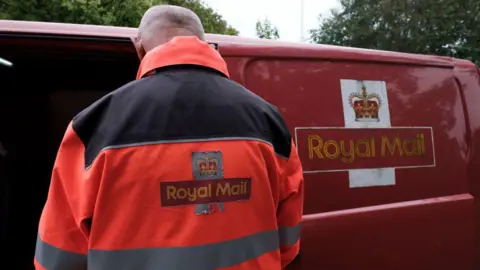Czech billionaire closes in on deal to buy Royal Mail
 Getty Images
Getty ImagesThe sale of Royal Mail to Czech billionaire Daniel Kretinsky's EP Group is close to being finalised and could be confirmed in the next two weeks, according to sources close to the deal.
Kretinsky has agreed to make extra concessions in order to clinch the takeover, the BBC understands.
Unions have been meeting with Kretinsky’s advisors this week, and while some sources say they remain "wary" of him, the Communication Workers Union (CWU) said meetings with the EP Group have been "constructive".
The deal will still have to be approved under the National Security and Investment Act although officials carried out a similar review when he increased his stake in the company.
The entrepreneur has already offered the following guarantees in a bid to secure the deal:
- Maintaining a one-price-goes-anywhere "universal service", which means it has to deliver letters six days per week, Monday to Saturday, and parcels Monday to Friday
- Not to raid the pension surplus
- Keeping the brand name and Royal Mail's headquarters and tax residency in the UK for the next five years
- Respecting union demands for no compulsory redundancies to take place (until 2025)
It is thought additional safeguards may include extending the duration of the guarantees he has offered.
The BBC understands they have been sufficient to satisfy the UK government that Daniel Kretinsky is a suitable owner for this historic and important organisation.
Speaking in front of MPs on Tuesday, Business Secretary Jonathan Reynolds referred to him as a "legitimate business figure" whose alleged links to Russia had already been reviewed and dismissed when he became the biggest shareholder in the company.
A spokesperson for the CWU said its meetings so far with the EP Group have been "honest and constructive and are set to continue in the coming days."
The board of Royal Mail owner, International Distribution Services (IDS), has recommended the £3.6bn offer price to its shareholders and it is expected sufficient numbers of them will accept, allowing the deal to go ahead.
Royal Mail, which was split from the Post Office and privatised a decade ago, has seen its performance deteriorate in recent years, leading to heavy financial losses.
Customers have also complained about deliveries, with important medical appointments and legal documents not delivered on time.
The volume of letters being posted in the UK has plummeted too, with half the number being sent compared to 2011 levels.
Meanwhile, parcel deliveries have become more popular - and more profitable.
Parent company IDS made a small profit last year which was entirely generated by its German and Canadian logistics and parcels business, off-setting losses at Royal Mail.
The universal service obligation is currently under review, with Royal Mail suggesting to the regulator Ofcom that reducing second-class deliveries to every other weekday would save up to £300m a year and give the business "a fighting chance".
In an interview with the BBC earlier this year, Kretinsky said as "as long as I am alive" he would honour the universal service obligation – but was in favour of the Royal Mail’s suggested reforms.
Mr Kretinsky's EP Group declined to comment. The Department for Business has also been contacted for comment.
Who is Daniel Kretinsky?
Daniel Kretinsky started his career as a lawyer in his hometown of Brno, before moving to Prague.
He then made serious money in Central and Eastern European energy interests.
This includes Eustream, which transports Russian gas via pipelines that run through Ukraine, the Czech Republic and Slovakia.
He then diversified into other investments, including an almost 10% stake in UK supermarket chain Sainsbury's and a 27% share in Premier League club West Ham United.
The Czech businessman is worth about £6bn, according to reports.
